Mechanicus is Warhammer: 40,000 meets XCOM but with unique ideas of its own
No space marines, no cover. No worries.
Mechanicus has a couple of challenges ahead of it. One is standing out from all the other Warhammer 40,000 games—we've just had an action-RPG, soon we'll have a 4X that looks a bit like Warlock with orks, there's another turn-based game in Early Access—but developers Bulwark and publisher Kasedo Games have an idea for how to manage that. It's a pretty obvious one: their game won't have any space marines in it.
To be fair there have been other 40K games without space marine protagonists, but even then they've shown up as allies and enemies so often it's easy to see those distinctive shoulder pads and get a bit fatigued. And yet, they keep showing up. "I think people are like, 'Oh god, if we don't have space marines it's not a 40K game' or 'It's not gonna be well-received', I guess," says producer Andrew McKerrow. "But it doesn't have to have space marines [to be Warhammer 40,000] in my eyes."
Instead, Mechanicus focuses on a conflict between the tech-priests of the Adeptus Mechanicus, religious cyborgs who look like Doctor Octopus if he became the Pope, and Necrons, aliens who long ago gave up on biology to go full-blown robot. There's an interesting thematic conflict between the two, each representing a different strand of transhumanism. Players will be taking on the role of the tech-priests, characters who have shown up in supporting roles in a couple of previous videogames but never been the heroes of one.
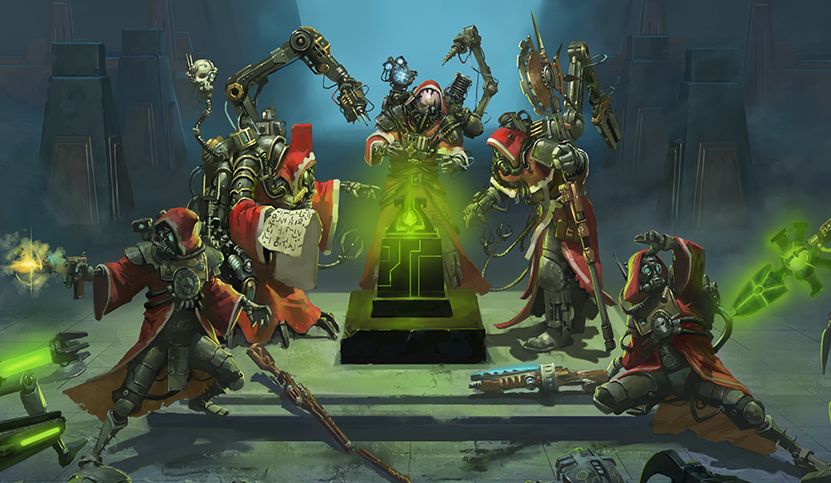
"They are a new faction as a collectible army with the actual tabletop game," says McKerrow, referencing the 8th edition of Warhammer 40,000, which rounded them out and boosted their popularity. "Probably because of their newness it wasn't really jumped on. But for me that was a great opportunity because I'd seen that and I was like, this is the coolest army ever, why is no one taking advantage of it?"
McKerrow was responsible for pitching the idea of tech-priests as the heroes of a game. He'd read one of the official novels, Mechanicum by Graham O'Neill, and fallen in love with these underused weirdos who worship a Machine God and consider oiling engines and hitting machines so they work to be sacred acts. He's excited about being the first to nail down everything from the color of their energy weapons to the sounds they make. "No one's made the noises for the Adeptus Mechanicus, so we're making that for the first time. What an opportunity!"
The Enemy Within
Doom's done a really good thing, it made cover and hiding behind walls the worst thing you could do
Andrew McKerrow
The other challenge facing Mechanicus is that it's a squad-level turn-based tactics game explicitly influenced by XCOM, and that too is becoming a crowded space. Fortunately, they've got some ideas on that front, as well. "We decided not to go with cover," says McKerrow, as if it's not a big deal to drop one of the genre's central ideas. "We've all played a lot of tactical games where you're in cover and yeah, you do get that feeling of 'we're a proper squad hiding behind cover and taking the best tactical way of survival, but it's kind of taking a while?'" So Mechanicus won't give bonuses for kneeling behind a low wall—objects may still block line of sight, but if you can be seen you can be shot.
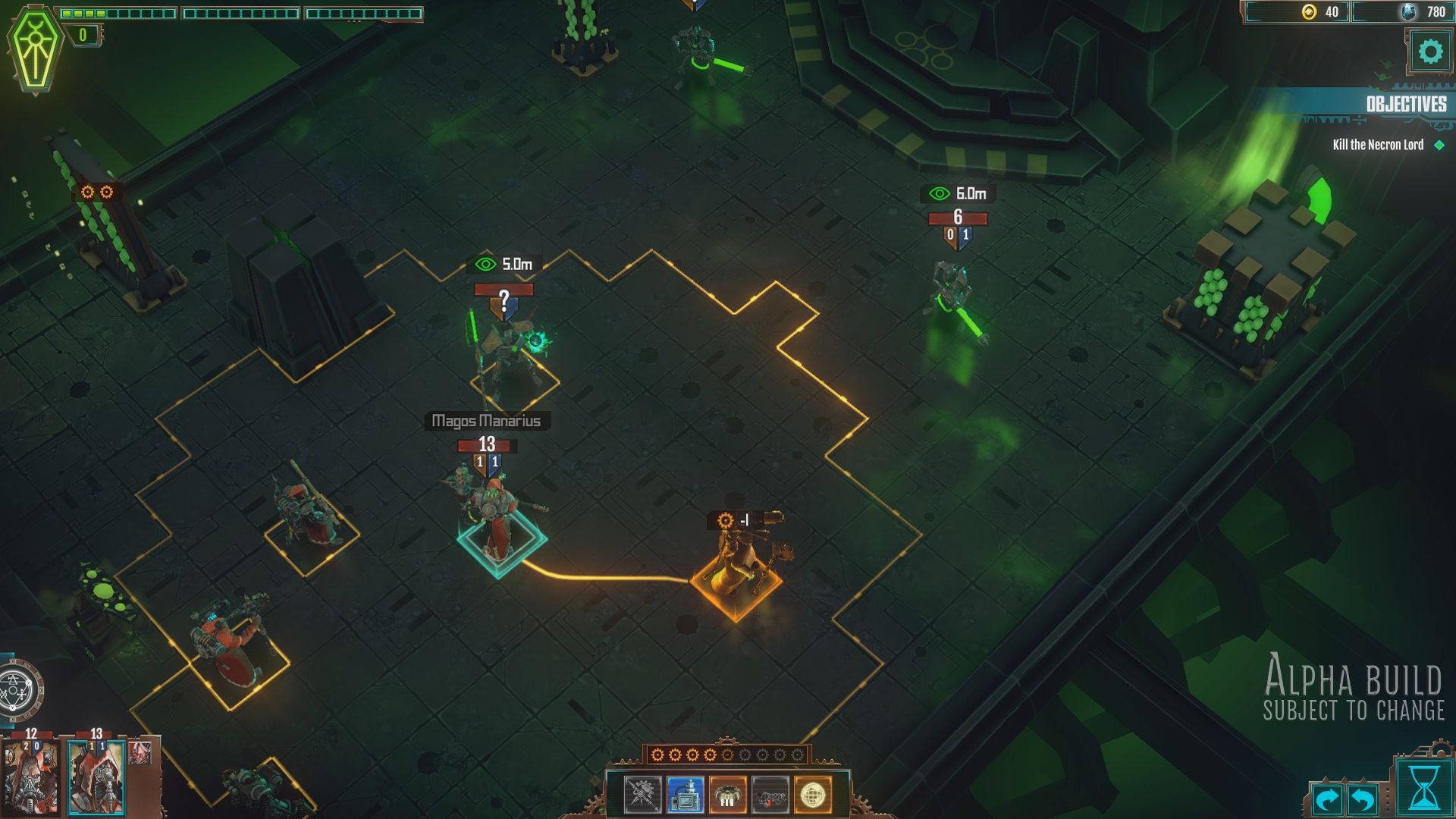
The inspiration for that came from an unexpected place: Bethesda's remake of Doom. "I played Doom and I was like wow, man, this is amazing. Why is that? I watched a lot of developer interviews and talks about that and we were like, Doom's done a really good thing, it made cover and hiding behind walls the worst thing you could do and I was like 'How did they do this?' The way they did it is they reward you for getting up close, personal."
Keep up to date with the most important stories and the best deals, as picked by the PC Gamer team.
The way he talks about it reminds me of another Warhammer 40,000 game, Relic's Space Marine from 2011. Though it superficially resembled every other third-person shooter of the era, Space Marine was all about charging forward into crowds of orks like an armored lawnmower. 40K is a setting where people have long-range weaponry but also carry chainswords and power axes, and there need to be reasons to make use of those.
"Unless it's an actual wall that's the size of me, there's no point in hiding behind things," McKerrow continues. "What I need to do is I need to charge forward with the higher-armored guys and have the long range guys that don't have armor stand back. And we reward the player with cognition points, which is a unique mechanic where for each point it allows you to move further than your normal movement or it allows you to use more powerful weapons or to make your basic attacks become critical attacks."
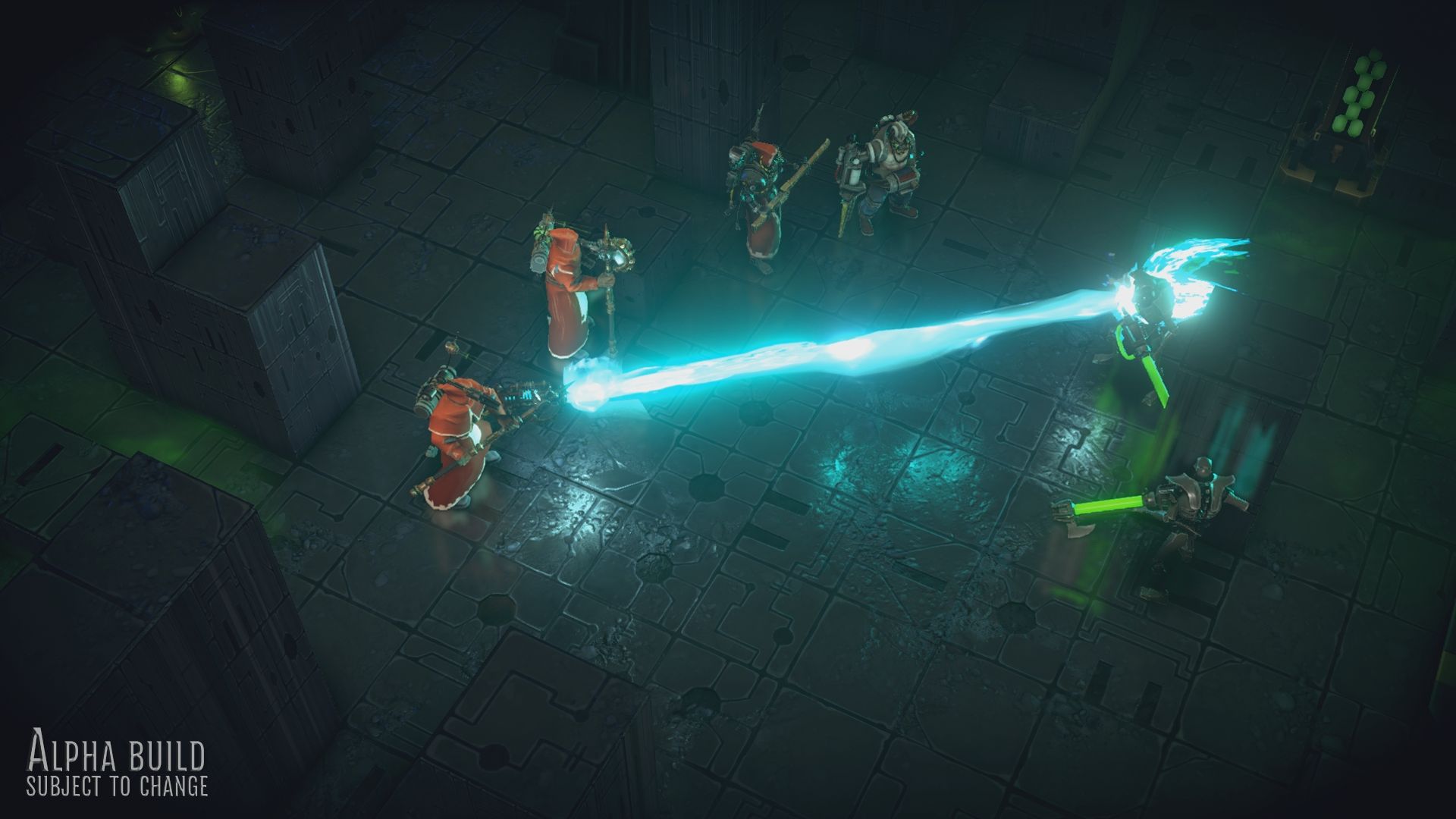
Cognition points reflect the learning you've gained from studying the enemy, and allow you to make smarter tactical choices. To farm them you need to stand next to the corpse of a Necron when they die, creepily studying the machines as the light goes out of their eyes.
Another way Mechanicus encourages action is that you're not punished for treating grunts as disposable. While the tech-priests are valuable as individuals, each one can bring a small retinue of throwaway troops with them, including soldiers called the skitarii and servitors who are basically lobotomized criminals transformed into combat cyborgs like the tank-treaded kataphron breacher. They still gain experience and upgrades, but they do so collectively. Improve one servitor and you improve them all, no matter how many blow up.
But wait, there's more
Each dungeon will have a miniboss, which is the Necron Lord
Andrew McKerrow
XCOM-likes are similar to sandwiches, in that they're better with more layers. Here there are two of them. The first is the Ark Mechanicus, the ship you captain as 'Dominus Faustinius'. It's where you return between missions and where all companions and armory and so on are. But when you leave the ship for a mission there's another layer between that and combat. You're exploring tombs on the world of Silva Tenebris in search of lost technology, and those explorations play out as dungeon maps with choose-your-own-adventure encounters in each area.
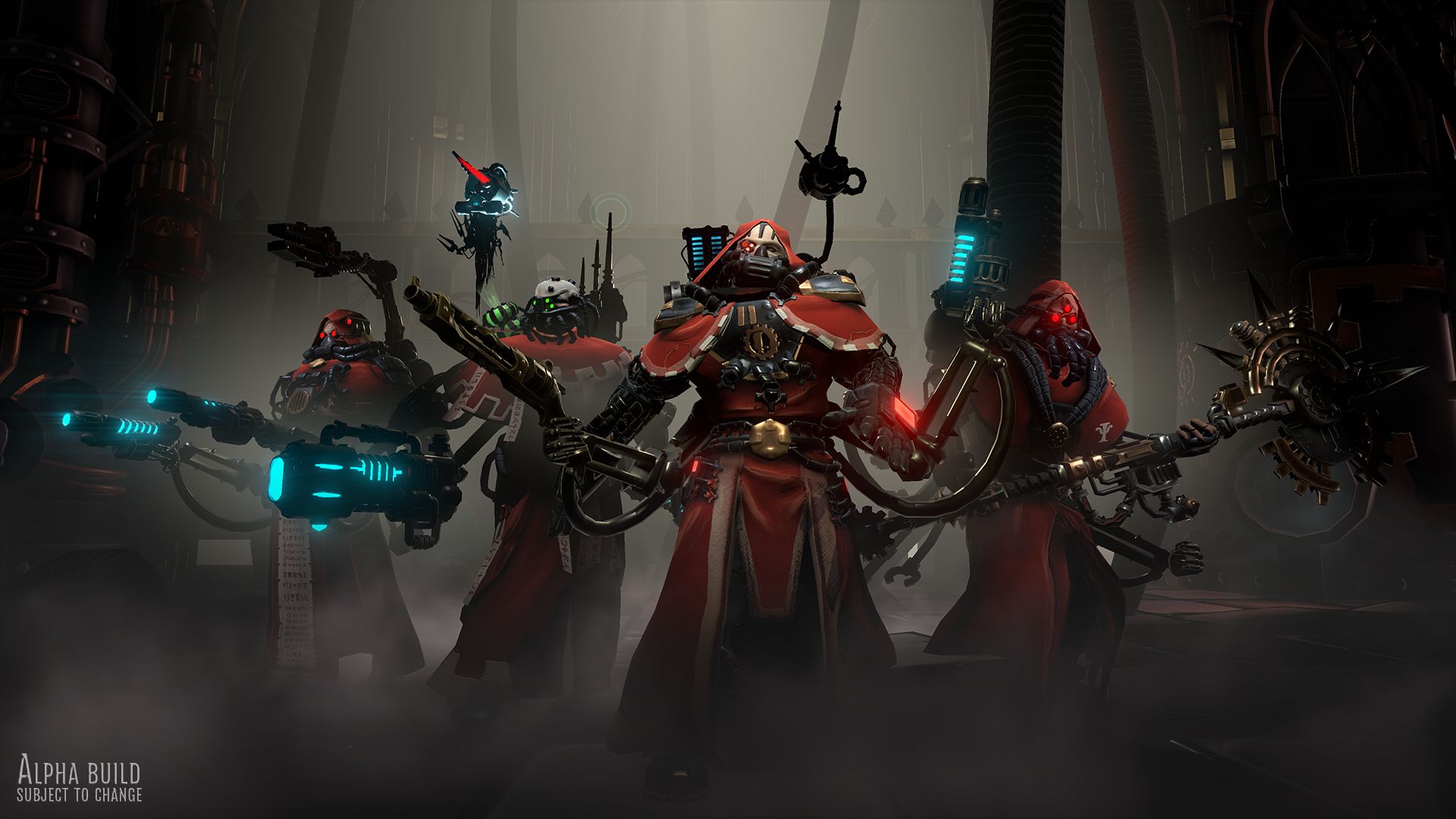
"You go room to room, collecting different resources or coming across certain events that will give you positive/negative options. Some of them may be clear, some of them may not. You come across a dead priest and you're like, 'What do we do with him?' You get to decide as the Dominus, do we take him back to the Ark Mechanicus and try and restore him, or use him as a shell, if that makes sense, where we can install other priests? Do we just leave him or do we set him on fire to make sure he never comes back to life ever again? Each one of those options gives a completely different result."
There's a ticking clock during this dungeon crawl. Each encounter, whether it leads to combat or not, fills up a bar as more Necrons stir. "Every time it fills a whole section, which'll be like five rooms or five actions, the Necrons will get a buff. When you go into another fight Necrons move faster, Necrons increase damage, Necrons may revive faster, Necron Lord is awoken. Each dungeon will have a miniboss, which is the Necron Lord. Originally the idea is he stays in his room and he's a good boy and sits there but we're looking into how we can get—when that action happens he can then move through the rooms, trying to hunt us down so then he forces a fight in his domain."
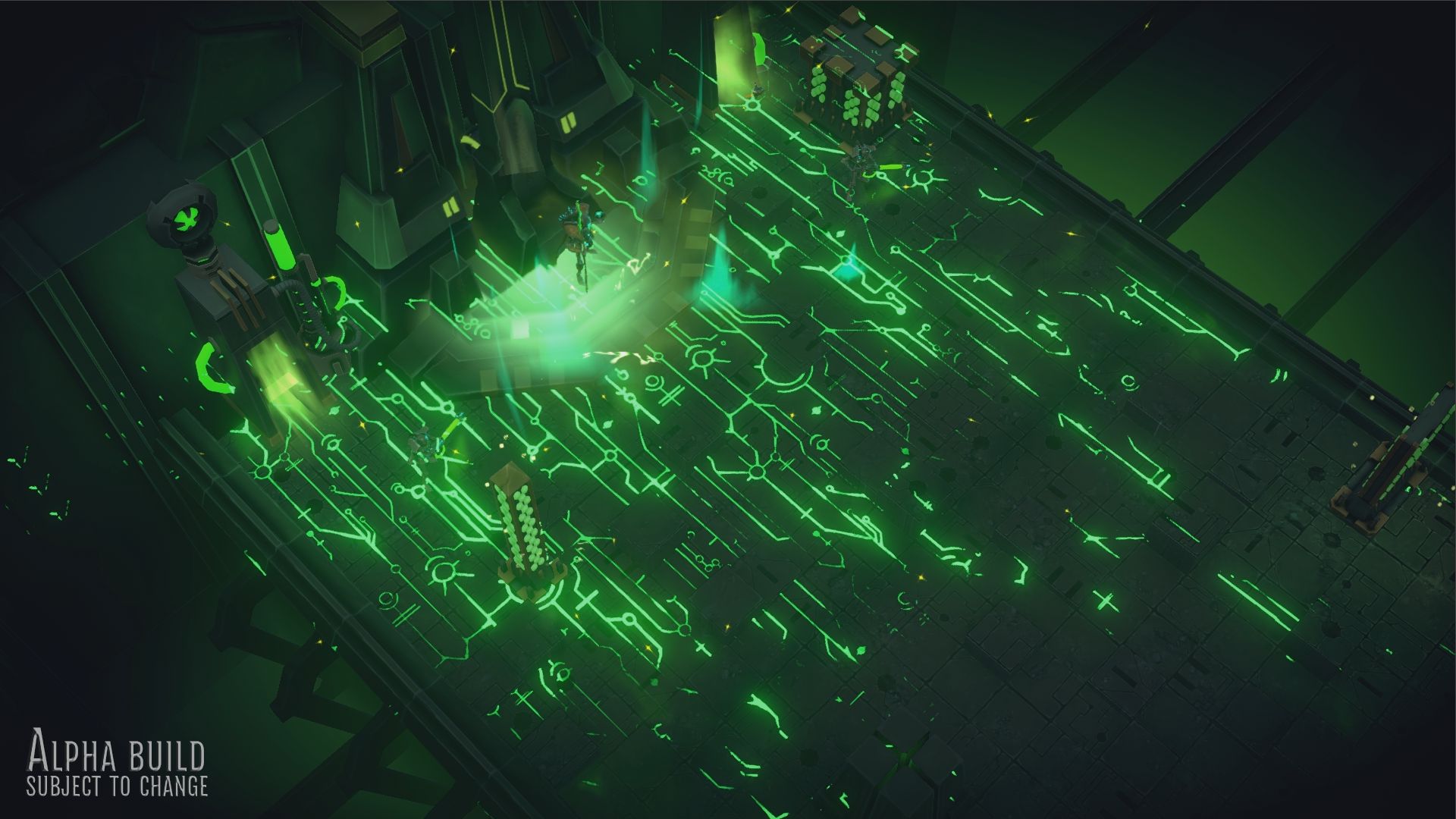
It's a structure that owes something to FTL, only with undead robots clawing out of their tombs rather than a fleet pursuing you from node to node, and it's another bit of differentiation making Mechanicus something unique. They've been working on this game for about a year and a half, and it shows in the thoroughness of the concept.
"We even made a paper tabletop version where we printed out pictures of like skitarii and used them as board pieces," McKerrow says, "so we've been concepting mechanics and things like that for ages and the core mechanics are definitely working very well, it's the extra abilities and the weapons and how our tech-priests are gonna level [that are still unfinished]."
They're "getting closer to entering beta" and aiming for release by the end of the year. In the meantime, you can check the Steam page for more info.

Jody's first computer was a Commodore 64, so he remembers having to use a code wheel to play Pool of Radiance. A former music journalist who interviewed everyone from Giorgio Moroder to Trent Reznor, Jody also co-hosted Australia's first radio show about videogames, Zed Games. He's written for Rock Paper Shotgun, The Big Issue, GamesRadar, Zam, Glixel, Five Out of Ten Magazine, and Playboy.com, whose cheques with the bunny logo made for fun conversations at the bank. Jody's first article for PC Gamer was about the audio of Alien Isolation, published in 2015, and since then he's written about why Silent Hill belongs on PC, why Recettear: An Item Shop's Tale is the best fantasy shopkeeper tycoon game, and how weird Lost Ark can get. Jody edited PC Gamer Indie from 2017 to 2018, and he eventually lived up to his promise to play every Warhammer videogame.

